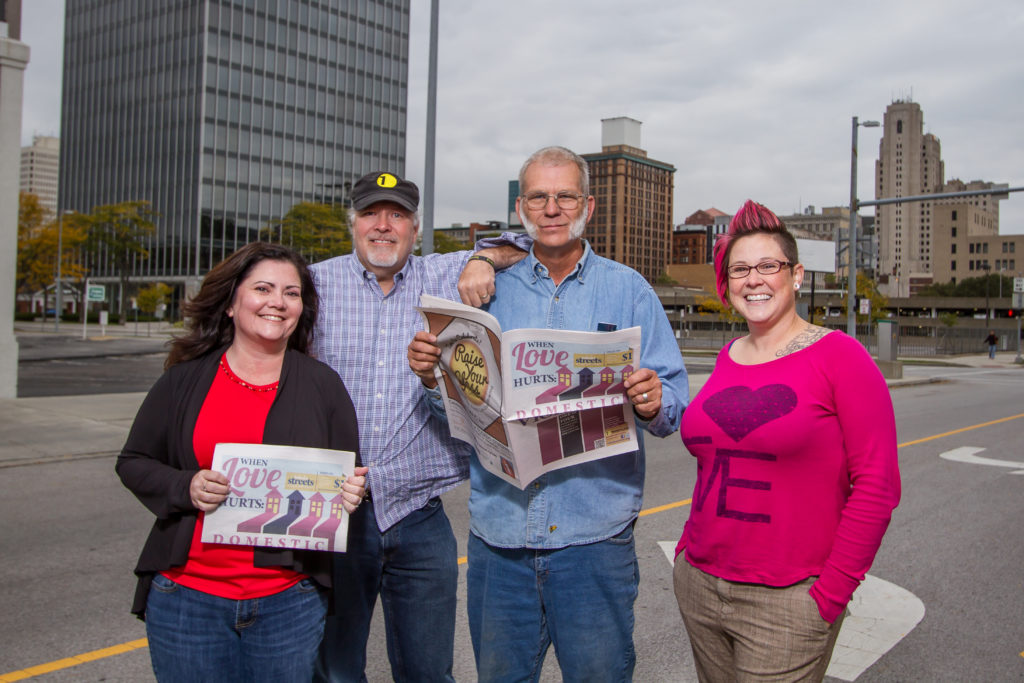
After serving 21 years in a Texas prison, Lawrence Staler owed $59,800 in back child support payments in Ohio. He was sent to Bowling Green through a prisoner transport system to meet his obligations.
Without a job or a home and with a weight of debt, his future looked uncertain.
The now-56-year-old found his way to Cherry Street Mission, a homeless shelter in Toledo, where he met Amanda Zuehlke, who would transform his life through her newspaper, Toledo Streets.
The urban, sold-on-the-street newspaper that serves homeless people turns 5 this year.
To honor the anniversary, Toledo Streets will hold a fundraiser, “Raise Your Glass,” Oct. 17 that will coincide with Glass Month in October.
The fundraiser, presented by Columbia Gas of Ohio, runs from 7-10 p.m. Oct. 17 at the Gathered Art Gallery, 23 N. Huron St., and will feature live glass blowing, an auction of the glass creations and refreshments. Two drinks tickets will be handed out at the door. Tickets should be purchased in advance for $35 at toledostreets.org/tickets. Space is limited.
For Zuehlke, the wheels started turning on an idea for a street paper in 2008 after she attended Tent City in Toledo. She began educating herself on homelessness. In the spring of 2009, a friend sent her a New York Times article on street papers and she thought again how much she’d like to be a part of that movement in Toledo.
She talked to people. She attended a North American Street Newspaper Association conference in Denver and then teamed up with Ken Leslie of 1Matters who pitched in with financial support. The first issue came off the press Oct. 15, 2009, with a feature story celebrating 20 years of Tent City.
For its first three years, Toledo Streets was operated by volunteers. Zuehlke was doing a great deal of the work — all the layout, the editing, some of the writing and running the vendor management program. Today, it has a paid staff of two and a brand new 501 (c) 3 status with eight board members.
“I’m working on issue 39,” said Zuehlke, who got married and moved to Cleveland but continues as interim director and serves on the board. “We recently made a commitment to being a monthly publication now. The people we serve deserve to have a fresh product.”

Leslie, whose nonprofit 1Matters has been the parent company of Toledo Streets from the get-go, likened the newspaper’s new nonprofit status to a child leaving the nest.
“It’s awesome,” he said. “It’s like a 30-year-old child still in the basement and you’re glad when it gets out on its own. The bird is kicked out of the nest. It will fly and it did fly. It will continue to be successful.”
The eight board members are Zuehlke, Leslie, Karin Coble, Liz Simon, Jason Copsey, Steve Atkinson, Ann Malak and Greg Loeb.
Zuehlke gives Toledo Streets credit for making her into a better person.
“When I started the paper, I was a broken and a quite often depressed person. There was a huge poverty of self and in doing this and working hard and through all the ups and downs and doing something that was bigger than me really just prepared me for the next stages of life,” Zuehlke said.
Last May, Zuehlke tied the knot and now has two “amazing” step-daughters, she said.
“I don’t think I would have been the person to step into that and been able to succeed with it [if not for my experience],” Zuehlke said. “Toledo Streets has made me richer.”
She sees her role as a cheerleader, supporting the vendors in the often thankless job of selling the paper.
The vendors who hawk the paper at select locations around the city are direct benefactors of the paper. The first 10 papers they sell for a suggested donation of $1 are free. After that, the papers cost them 25 cents to sell to cover operating costs. They keep every cent they earn.
The program is called a microenterprise venture and vendors are responsible for paying their own taxes.
Currently, there are 12 vendors but none of them are what Christy Grob calls “unhoused.” Grob is the manager of the vendor program, providing guidance, support and encouragement. They are a diverse group, she said.
Some have been homeless in the past or are currently in danger of becoming homeless. Others came from a shelter and worked their way up to an apartment. Still others have their own place and car but are living in poverty.
“We have young ones and older ones, quiet ones and go-getters,” Grob said.
In her year and a half at Toledo Streets, Grob said she’s seen half a dozen people go from living in a shelter or couch surfing at a friend’s house to renting their own apartment or finding that traditional job they’ve been searching for.
Unfortunately, most vendors don’t stick with the program, Grob said.
“The vendors get out of it what they put into it,” she said. “We provide the opportunity for them to work their way and get what they need out of life.”
The average vendor makes $14 an hour. Some might make $25 an hour, others $5. It depends on the vendor, Grob said.
After Staler met Zuehlke, she had him fill out a form and gave him the 10 free issues. He didn’t know where to sell, so Zuehlke set him up at the Municipal Court at 555 Erie St. Downtown.
“I thought to myself, ‘If I can’t sell these things, I’m going to throw them in the trash,’” Staler recalled during a recent phone interview. “I sold them within the hour.”
With about $15, he bought his second stack of papers at 25 cents each. Soon, he was selling 250 to 300 papers a week at the courthouse. At the Old West End Festival one year, he made $650 over two days.
Staler started paying down the child support he owed. He has been able to reduce his debt by several thousand dollars, he said.
In 2012, Staler was appointed by Leslie to advertising sales representative for the paper. That year, he made $18,000 in six months. In 2013, he became senior sales representative and was able to put a down payment on an acre and a half lot in Oregon.
Today, Staler doesn’t have much time to sell ads, or the paper. He has moved into a full-time job at Aqua Blok operating a forklift. He works 12-hour days, five days a week. Next year, he has plans to build a home on his property. He’ll live there with his new wife, Patricia, whom he married May 1.
What’s the secret behind his success?
“I took the hustle I developed in prison and found a way to use that on the streets selling the street paper,” Staler said. “I’m aggressive when I sell. I’m bold when I sell. When people say ‘Get away,’ I say ‘What? Do you have a problem with the street paper?’ Some actually stopped and listened to me and some actually wanted the paper.”
Vendors must obey the laws of the city, stay off private property and, for their protection, wear an orange safety jacket if they step into the street to collect money from a car. They must respect customers and other vendors. Other than that, they have freedom in how to sell the paper.
“It’s all up to them in how they run their business,” Grob said.
Staler related a story about a man who came out of the courthouse in 2012 “stomping and cursing.” Staler said he tried to give the man a paper but the man just cursed him.
“I said, ‘God Bless you,’” said Staler, who turned to Christianity in 2004 while in prison.
The man paid for a paper with a $50 bill that day and he returned to Staler for a paper every year thereafter, always paying with a $50 bill.
After Staler started making good money this year, he told the man to keep his $50, that he didn’t need it anymore.
“It wasn’t a job for me,” Staler said. “Yeah, I made good money and made a lot of people smile but it was fun for me.”
Staler gives most of the credit for his success to Zuehlke.
“People come to us with different work ethics,” Zuehlke said. “We’re dealing with people who have been beaten down by life and constantly rejected and looked down upon.”
Some vendors have been with the paper for a couple of years, which is fine, said Karin Coble, the new president of the board of directors. Others go on to different jobs and careers.
“We want to serve as many people as want to work,” Coble said. “We try to make ourselves available to anyone who is ready and willing to start this process of getting back to work.”
Toledo Streets has also seen some other changes recently.
Rachel Richardson was hired July 1 as development director. Her job is to raise money and so far, has secured a corporate sponsorship for $10,000 with TARTA. In the deal, TARTA will get editorial space in the paper every month and will have a column, “The Bus Stop,” on schedules and changes to its bus routes.
Toledo Streets is looking into moving into its own space. Several locations are being considered, from Uptown, to Lagrange Street to the Old West End. They are searching for store-front property where they can hold their vendor support meetings, do programming and distribute the paper.
“It’s all about giving them an opportunity to give them autonomy and be more financially stable,” Coble said. “We look to transition people. Our hope is they’ll learn the skills through working with us.”



